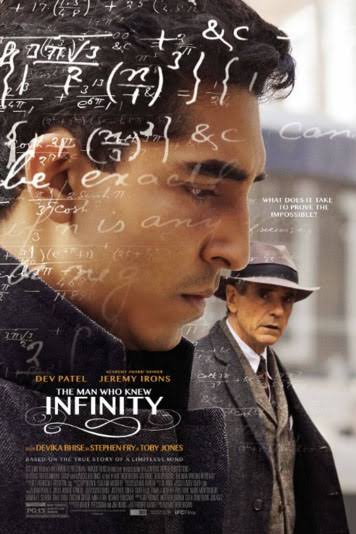The Man Who Knew Infinity: Movie Review

It is very difficult to write an objective review when the subject is a movie based on the biography of Srinivasa Ramanujan. Nonetheless, I shall try to give an overview of what the movie has to offer. This is a good movie; it is not the best movie based on a mathematician’s life nor is it an average movie. Robert Kanigal’s book The Man Who Knew Infinity, on which the movie is based was in my opinion an excellent mathematical biography. There was the perfect balance of mathematics and romance in the book, which I found somehow lacking in the movie. But this is to be expected in any movie of such a genre.
The movie begins with Ramanujan working in the floor of a temple in his hometown and then shifts to his struggles in finding a job, until he is rescued by a few good Samaritans. Urged by them, he writes to G. H. Hardy, the foremost British pure mathematician at that time. The rest, as we all now know is history. The movie for the most part shows Ramanujan’s time in Cambridge where he worked alongside G. H. Hardy and found many remarkable results. The most prominently displayed formula in the movie is the truly marvelous asymptotic estimate for the number of partitions of a natural number, which Ramanujan and Hardy proved. This seemingly intractable problem’s solution sealed Ramanujan’s immortality in no less terms. There were accolades which followed his achievements, first a fellowship to the Royal Society (the elite group whose members at one point boasted the likes of Sir Issac Newton) and then a fellowship to Trinity College (being the first Indian so honored) and it seemed for some time that everything would be fine for Ramanujan now.
It was a tough time for a vegetarian orthodox Tamil Brahmin at that time of World War I to live in a war rationed England. This took a toll on Ramanujan’s health and he fell ill while in Cambridge. But, this in no way hindered his pursuit of mathematics and he continued to work even on his death bed. Ramanujan returned to India, a mathematical hero. His legend was in place and he had created some wonderful new mathematics. But the cruel blow of death was stuck very early and Ramanujan like many fine mathematicians before him, left for his heavenly abode at the age of 32. The movie shows all these things in poignant detail and it would be very hard not to let a tear slide down your cheek when you realize how hard it must have been for this great man to have survived such hardships. The scenes at the end, where Hardy presumably delivers the obituary of Ramanujan at a Royal Society meeting is one which I will remember for the rest of my life. Here was a man, who was the greatest at that time, bowing in awe to an Indian mathematician who only worked for a decade or so. This scene should in my opinion be one of defining movie scenes of our times.
The director, Mathew Brown has done a really good job in this movie. The added advantage of having two very prominent mathematicians, Professors Manjul Bhargava and Ken Ono as consultants in the movie, meant that the mathematics displayed was always accurate and at the same time not too technical for the normal person to understand and appreciate. The acting of Jeremy Irons who plays Hardy is as usual top-notch. However, for me the surprise element in the acting department was Dev Patel, who plays the role of Ramanujan in the movie. To be honest, I was never a fan of Patel and was slightly disappointed when I came to know that Patel was cast for the role of Ramanujan. However, all my fears were assuaged when I saw his acting, he was simply brilliant in this one. I would love to see some of his other works now. Ramanujan’s wife, Janaki was played by Devika Bhise, who I feel has potential but it was not possible to utilize that talent well because Ramanujan had stayed for the most part away from his wife while he was alive and this meant less screen time for Bhise.
The last thing that I would like to write about is the historical accuracy of the facts presented in the movie. For the most part I felt that the movie was very level-headed and there were not too many dramatizations of incidents in Ramanujan’s life. Some usual movie spice should be added in appropriate amount in any good story, and this was also the case here. But to the best of my knowledge I could not find anything misleading from the truth. This is certainly one movie I would wholeheartedly recommend to anyone interested in mathematics, and also to the laymen to know more about one of the greatest mathematicians of all times.
